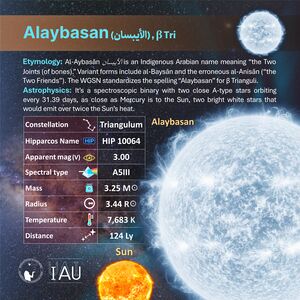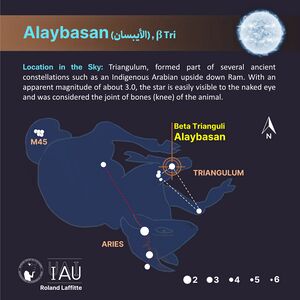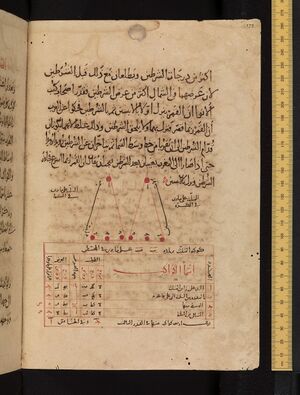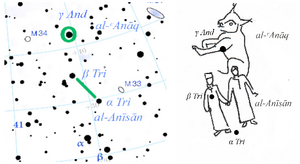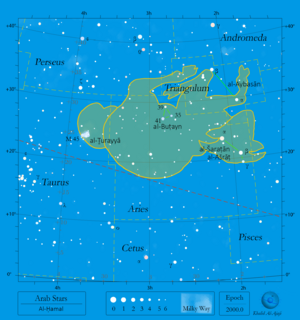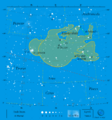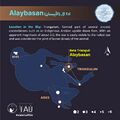Alaybasān (الأيبسان)
al-Aybasān (الأيبسان), the Two Joints (of bones), is an Indigenous Arabian asterism. Name variants are Al-Anīsān (الأنيسان) and Al-Baysan. The later spelling variant al-Anīsān that originated from a mistake changed the meaning, as it translates The Two Friends.
It is also a modern IAU-star name, then spelled without hyphen: "Alaybasan" is the name for β Tri in Triangulum.
Concordance, Etymology and History
Spelling Variants
- al-Aybasān (الأيبسان)
- al-Ayibsān (transliteration variant)
- al-Aybasān (transliteration variant)
- al-Ayibānān (transliteration variant)
- al-Baysan (transliteration variant)
- Al-Ubaysān (no meaning, misspelling)
- al-Anīsān (الأنيسان , variant / alternative name)
- Al-Unṯayān (no meaning, misspelling)
Based on classical Arabic sources,[1] the name Al-Aybisan, meaning "the two joints (bones) of Aries", while "Al-Anisan" may be a variant or alternative spelling of this name[2] (see below).
Concordance
In modern literature, the two versions Al-Anisan and Al-Aybasan appear. WGSN traced both variants and found them similarly old. However, “Al-Anīsān” (الأنيسان) is a scribal error that went undetected for a very long time. The correct name for the two stars α, β Tri is “al-Aybasān” (الأيبسان).
Story (Khalid AlAjaji):
For Ibn Qutayba, the editors said in a footnote that the word in the manuscript was without dots (n, i, or b letters all have the same shape but n has a dot over, the letter ya (i) has two dots under and b has one dot under). Khalid AlAjaji inspected the manuscript himself and found the word without dots. The editors of Ibn Qutayba manuscript said that correcting the word to be “Al-Anīsān” is according to the edition of al-Ṣūfī[3] book. This edition of al-Ṣūfī book was based mainly on the manuscript of Ulug Beg MS 5036 of BNF, where the name was without dots.
For ibn Sīda, the name “Al-Ubaysān” – Arabic (الأبيسان) has no meaning. The two letters يـ (ya) and بـ(b) have been switched and the dots were confused. The original should be “al-Aybasān” - Arabic (الأيبسان).
For al-Marzūqī printed book (Dār al-Maʿārif al-ʿuṯmāniya), the whole edition is full of errors and is not reliable, so we cannot trust that “ Al-Unṯayān” is a good reading of what was in the manuscript.
Another edition of al-Marzūqī (al-Azmina wa al-Amkina) by Dr. Moḥammad Nayef al-Dulaymī is based on the edition of Dār al-Maʿārif al-ʿuṯmāniya. Dr. al-Dulaymī tried to correct the errors on the first edition by comparing the text with other references and lexicons. He corrected “Al-Unṯayān” to be “Al-Anīsān”. His source was Dozy, Reinhart, Supplément aux dictionnaires arabes. We find there : الأنيسان : deux étoiles du Triangle, Sédillot 132, Alf. Astr. I, 55. Dozy is referring to Sédillo (1834/5)[4]:
- La boréale des Anisaine, ou boréale de la base du Triangle.
- L'australe des Anisaine, ou australe de la base du Triangle.
And to the Libros del saber de astronomía del Rey Alfonso X de Castilla, Tomo I, 55:
“et en aráuiguo almucalec. et a en esta figura cuatro estrellas. et es la primera en la cabeça del triángulo. et dízenle en aráuiguo raçalmucelet. que quier dezir la cabeça del triángulo. La segunda es la delantrera de las tres que son en ell fondon. et llaman á estas dos estrellas en aráuiguo alanicen.”
These two resources are dated ~ 1262-1279 AD and indicate that the printed material mentioning Al-Anīsān does not come from early sources.
The name "al-Aybasān" (Arabic: الأيبسان) appears in two key manuscripts from earlier periods. The first is Bodleian Library MS. Marsh 144, where it is written alongside the image of the Triangulum constellation. The second is Urjuzat ibn al-Ṣūfī's Poem of the Stars, found in the Laleli collection at Süleymaniye Library, MS 2698.
MS. Marsh 144 dated 400 H, (~ 1010 AD), was written by the son of al-Ṣūfī.
MS 2698, dated 718H (1318 AD), was copied from a manuscript dated 519H (1125 AD). It traces back to a manuscript written by the son of al-Ṣūfī, who authored the poem around 380H (990 AD).
One argument supporting “al-Aybasān” is its compatibility with the image of the Arabic Lamb.[5][6] Al-Aybasān refers to the two thin bones in the shins of the legs. The positioning of the stars aligns with the placement of the Lamb's front legs. Additionally, the name appears in the poem fitting the poem's metre, unlike “Al-Anīsān”.
| Al-Anīsān (الأنيسان) | al-Aybisān (الأيبسان) | Al-Ubaysān
(al-Baysān) (no meaning) |
Al-Unṯayān
(no meaning) | ||
|---|---|---|---|---|---|
| Ibn Qutayba(al-Anwāʾ fī Mawāsim al-ʿarab)[7] | x | ||||
| Ibn Sīda (al-Muḫaṣṣaṣ, 9th book) | x | ||||
| Al-Marzūqī (al-Azmina wa al-Amkina) | x | ||||
| ~1010 | Bodleian Library MS. Marsh 144[8] | x | |||
| ~1270 | Libros del saber (1262-1279) | x | |||
| 1318 | Urjuzat ibn al-Ṣūfī's Poem of the Stars[9] | x | |||
| 1319 | ibn Sīda[10] | x | |||
| al-Marzūqī | x | x | |||
| 1834/5 | Sédillo (1834/5) | x | |||
| 1959 | Kunitzsch (1959: 37, No 12)[11] | x |
Identifications & Maps
al-Aybasān per Khalid AlAjaji
Conclusion
- The name of the two stars α,β Tri is “al-Aybasān” - Arabic (الأيبسان).
- “Al-Anīsān” - Arabic (الأنيسان) should not have an independent entry and should be noted as a scribal error.
- The name “al-Ayibsān” mentioned by Mr. Laffitte and Mr. Sadegh is a wrong transliteration of Arabic (الأَيْبَسان).
- The two names: al-Baysān and al-Ayibsān mentioned in the ASE: Al-Anīsān entry as spelling variants cannot be as such, and there is no clear meaning of these two words.
Al-Anīsān الأنيسان in Laffitte (2012[12], 2025[13]).
| αβ Tri | al-Anīsān | the Two Friends | Qutayba |
| al-Ḫiṣaṣ | the Notables | Ḏ. man. |
Transfer and Transformation
IAU Working Group Star Names
In 2025, WGSN discussed names for the stars in Triangulum.
- alpha was already named: Mothallah
- beta - there was a Chinese suggestion, but the Arabic Subgroup has strong reasons to get this star, as there is an old name "Al-Anisan" which only covers alf+bet Tri, while the Chinese constellation is much larger and its name can be used for other stars.
- The Arabic Subgroup studied the names and found that - indeed - Al-Anisan derives from a misreading, but it is as old as the original name Al-Aybasan.
- In respect and appreciation of the native people, the decision was given to the native Arabic group member.
The name "Alaybasan" was adopted by Beta Tri on 7 Nov. 2025. Hyphens are allowed in star names, but are depreciated due to common practice for centuries (see Aldebaran, Altair...).
Beta Trianguli was originally listed as a A5III (giant luminosity class) in the Morgan-Keenan (1943) and Johnson-Morgan (1953) compilations of MK spectral type standard stars. It is a bright (V=3.00 mag) star at distance 39 parsecs, and was among the most luminous stars with a dusty debris disk resolved by the Herschel Space Observatory (Pawellek et al. 2014). Beta Tri was discovered to be a spectroscopic binary by Samuel Mitchell in 1909, and resolved into its component stars using the Mark III interferometer on Mt. Wilson by Hummels et al. (1995). A recent detailed analysis by Picotti et al. (2020) finds the P=31 day binary is a case where the brighter star is actually the lower mass of the pair. Picotti et al. (2020) model star #1 as having brightness V=4.19 mag, spectral type A3III, and mass 3.5Msun, while star #2 has V=3.44 mag, spectral type A8III, and mass 1.4 Msun.
Following WGSN policy for a cases where proposed historical star names apply to the unresolved light of a stellar multiple, for this first named body in the system WGSN applies the name "Alaybasan" specifically to the brighter component (V=3.44).
Weblinks
Reference
- ↑ Bodleian Library, Marsh 144 – A manuscript of Ṣuwar al-Kawākib by al-Ṣūfī, dated ca. 400 AH
- ↑ Khalid al-ʿAjjājī’s commentary on Urjūzat al-Kawākib
- ↑ al-Ṣūfī, Abū al-Ḥusayn ʿAbd al-Raḥmān b. ʿUmar. 1981. Kitāb ṣuwar al-kawākib al-thamāniya wa al-arbaʿīn. Beirut: Dār al-Āfāq al-Jadīda.
- ↑ Sédillot, Jean-Jacques (1834/5).Traite des instruments astronomiques des Arabes compose au Treizieme siecle par Aboul Hhasan Ali De Maroc, Jean-Jacques Sedillot, volume 1, page 140
- ↑ Kitāb al-ʿayn, al-Ḫalīl ibn Aḥmad al-Farāhīdī (~719 – 790 AD), volume 6, page 234, edition by Dr. Mahdī al-Maḫzūmī and Dr. Ibrahīm al-Sāmirrāī. See also: ibn Qutayba, al-Anwāʾ, pg 17, al-Marzūqī, al-Azmina wa al-Amkina, ch 6 and 18.
- ↑ ibn Qutayba, al-Anwāʾ, pg 20, 21 and al-Marzūqī, al-Azmina wa al-Amkina, ch 6.
- ↑ Ibn Qutayba al-Dīnawarī, Abū Muḥammad ʿAbdallah b. Muslim. 1956. Kitāb al-anwāʾ (fī mawāsim al-ʿArab). Hyderabad: Maṭbaʿat Majlis Dāʾirat al-Maʿārif al-ʿUthmāniyya.
- ↑ Bodleian Library, Marsh 144 – A manuscript of Ṣuwar al-Kawākib by al-Ṣūfī, dated ca. 400 AH
- ↑ Süleymaniye Library, Istanbul – Lala Mustafa Pasha Collection 2698 – A copy of Ibn al-Ṣūfī’s Urjūza, dated 718 AH (copied from an earlier version dated 519 AH)
- ↑ Ibn Sīda, al-Mukhaṣṣaṣ, vol. 9 – Printed in Bulaq, Egypt (1319 AH)
- ↑ Kunitzsch, Paul (1961). Untersuchungen zur Sternnomenklatur der Araber. Wiesbaden: Otto Harrassowitz.
- ↑ Roland Laffitte, Le ciel des Arabes, 2012
- ↑ Roland Laffitte, Nommer les étoile: 500 noms hérités des Arabes - Apport de l'uranographie arabe, Orient des Mots, 2025 (online)
